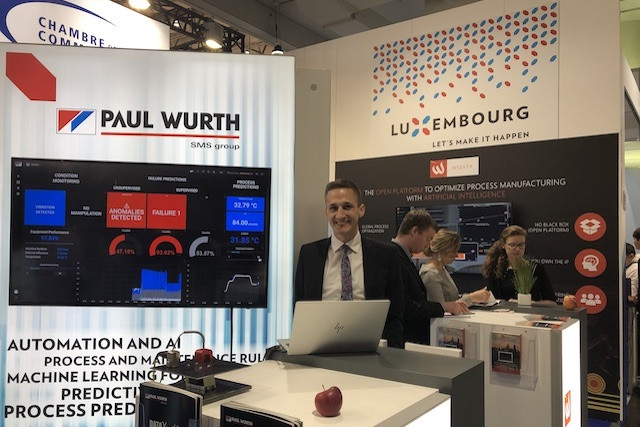This year’s fair runs from 1-5 April and anticipates welcoming around 6,500 exhibitors and 200,000 visitors from over 70 countries, Sweden being this year’s official country partner. Of the 27 buildings comprising the trade fair’s campus, the Luxembourg pavilion is situated in the only hall dedicated to research and technology (R&D).
Paving the way for innovation
At a Tuesday midday reception at the pavilion, Luxembourg ambassador to Germany Jean Graff called the overall fair “far-sighted”, adding that: “It is self-evident that the appropriate public institutions in Luxembourg have to guide and promote industry, especially in research and development projects, and thus contribute to its competitivity.”
By 2020, Luxembourg anticipates dedicating 2.6% of its GDP to R&D efforts. What’s more, the grand duchy has ranked among the top six “innovation leaders”, moving up from its previous rank of “strong innovator”, in the 2018 European innovation scorecard.

Jeannot Erpelding said that the recent announcement of free transport by 2020 and its 5G strategy have helped pave the way for innovation. Photo: Delano
Highlighting Luxembourg’s competitiveness and dedication to research and innovation, Jeannot Erpelding, director of international affairs at the Luxembourg Chamber of Commerce, one of the event organisers, said, “Our presence at the Luxembourg pavilion today shows a clear willingness of our country to be at the forefront of the digital revolution and evolution.”
New clients, technological inspiration
Among the Luxembourg exhibitors was Solarcleano which developed a robot to clean solar panels. Anthony Clarenne, engineer, said that there wasn’t really a similar product on the market when it was developed. His stand was busy at the time of Delano’s visit, many visiting to get a glimpse at the robot. “It’s not the most important fair for us--Intersolar is--but it allows us to get some ideas and see other technologies to get inspired.”

Anthony Clarenne of Solarcleano Photo: Delano
Also at the pavilion was Stephan Weyer of Paul Wurth, an international engineering company, part of the SMS group, whose main business is the modernisation and digitalisation of big plants and factories. “We recognised this technology can be quite nice for companies that don’t have the power to implement their own. Our digitalisation package is based on data acquisition and data processing with machine learning.” Weyer, who will be on site all five days, added that he’d had “nice discussions and also had the possibility to look around. People who came to our booth were quite interested in the package itself.”
Also looking for partners and potential clients was Tetralux, which works in data security by encryption. As its company representative Heiko Brandenburg explained, everything it develops and builds is done in Luxembourg and Germany, so “we’re free of legal restrictions like companies in China, America, Russia…we are more secure and trust[worthy] than companies overseas.”
Although he had also had interesting discussions, he said, “often you can judge such a trade fair’s impact only three, four, six months afterwards.”
Wizata, a startup which uses AI technology to empower industry and metal manufacturers to optimise their capabilities, had a small team at the fair. As CEO Jean-Philippe Hugo told Delano’s sister site, Paperjam, "the Chamber of Commerce does everything for Luxembourg companies and can be at a much lower price at the normal rate applied by the fair. It remains difficult to analyse the return on investment costs incurred, but it is certain that this type of global event gives us a good visibility.”
Read more about Wizata and industry 4.0 in the April/May 2019 edition of Delano.
